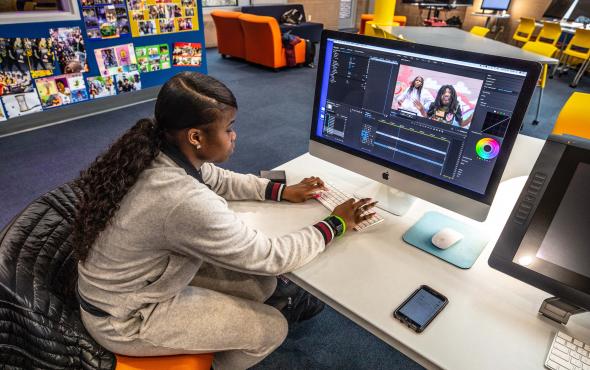In a “normal” year, Hope Community’s Best Buy Teen Tech Center is all about hands-on learning and exploring with a wide variety of complex multimedia — it’s everything from music production and graphic design to video editing, 3D printing and more. So when COVID-19 put an abrupt end to in-person programming last year, getting hot spots and laptops into the hands of young people was crucial.
“I think I knocked out deliveries to 13 different homes in one day,” recalled J.T. Evans, Teen Technology Center Coordinator at Hope Community.
Translating the Teen Tech Center experience — which is heavily hands-on, heavily one-on-one — into a virtual format was the next hurdle. Countless hours were spent reconfiguring workshops on complex skills like computer coding and Photoshop to be more Zoom-friendly. Even with all that preparation, it was chaotic at first with 10-15 young people logging in simultaneously. “This is industry-standard equipment we’re working on, so it can be pretty in-depth,” explained J.T. “I found the way to really break through was to do one-on-one sessions. ’Share your screen’ became my go-to.”
Keeping young people engaged in a virtual setting meant flexing some familiar youth-worker muscles in new ways. “Youth really are longing for accountability,” J.T. reflected. “When you actually buckle down and keep it real with them, when you let them know if they drop the ball, even in an online setting, that creates a stronger relationship. That’s a sign of caring.”
The new virtual format came with an unexpected benefit for several young people. “The pandemic made it easier for some youth to participate,” noted J.T. “They didn’t have the barriers of trying to find a ride, or watch their younger brother or sister, or know which parent’s house they’d be staying at. We even had youth join from their car.”
“That’s something we’ll take going forward, finding ways to use the virtual tools even when we can be back together in person,” he continued.
As an added bonus, Hope Community youth used the resources and skills they learned through the Teen Tech Center to stay engaged during distance learning. “What we’re doing here has multiple purposes,” said J.T. “It’s empowering young people here at Hope Community, with their school work and beyond.”
C2C: Cutting Through Zoom Fatigue
Meanwhile, J.T.’s colleague Nakara White was settling in to her new role as a youth program specialist with Hope Community’s C2C Clubhouse-to-College/Careers.
“I was hired in the throes of COVID, so it’s all been virtual,” explained Nakara. C2C is a program within the Teen Tech Center that links young people with low income to technology career pathways, including mentorships, internships and skill development. “There are other C2C groups across the country, but my group is unique in that it is all young women of color ages 15 through 19,” noted Nakara. “We focus on self-esteem and sisterhood in addition to technology skill sets.”
Pandemic-friendly activities included online workshops, small group meetings, mentorships and even a Black Women in Technology panel. Over time, “They were tired of the masks, tired of screens,” Nakara shared, and engagement became a challenge.
“C2C programming takes place on Saturdays,” Nakara continued, “so it’s supposed to be their day off. Zoom fatigue set in and I could tell there were times when they didn’t want to be there.”
Like J.T., Nakara found that keeping young people accountable helped deepen their relationships. “I had the young people sign contracts that included their personal goals,” she noted. “That reminded them of their commitment to show up, and show up on time, and have their screens on and be engaged. Being able to pull up that contract and tell them when I was disappointed opened up opportunities for more in-depth conversation about what really mattered to them, as well as what else might be going on that was keeping them from being engaged.”
“They showed up because they were committed, and it was important to them to continue to build relationships with me and the other girls in the program,” Nakara continued. “It demonstrated to me how serious some of the youth are in really valuing this opportunity to learn and grown and develop skills they can put on a resume.”
As COVID protocols are easing up, the C2C youth are very enthusiastic about connecting in person. “My girls are like, we love you, this has been great, but now it’s time to meet in person,” laughed Nakara.
Good timing, because their first in-person meeting will take place later in June 2021.
